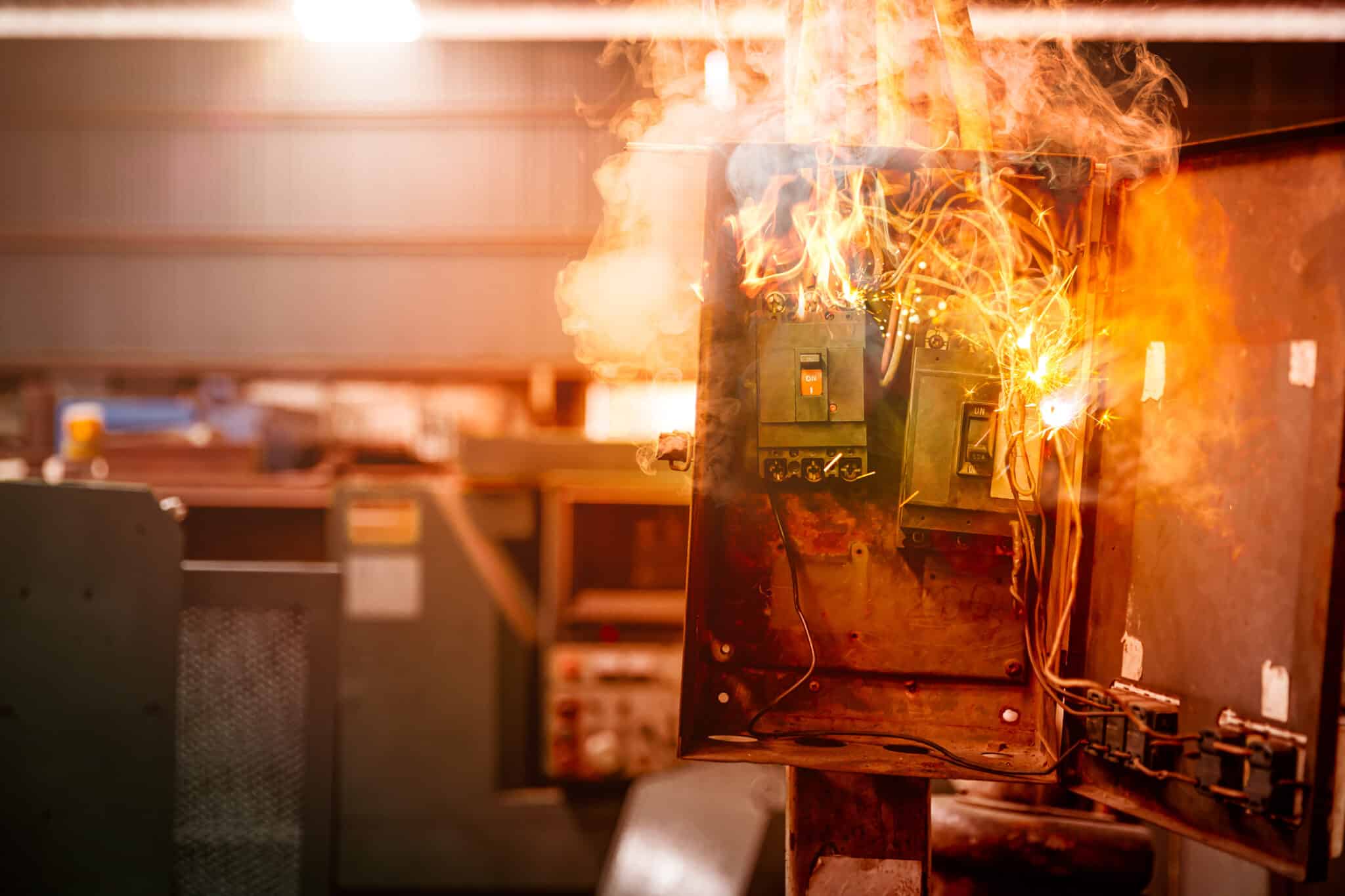A faulty circuit breaker can pose serious risks to your home and safety. Whether you’re flipping on the lights or powering up your favorite appliance, your electrical system should run smoothly without unexpected interruptions. But when circuit breakers begin to fail, warning signs often surface long before a full breakdown occurs.
In homes around Columbia, SC, recognizing these early signs is key to preventing electrical fires, damage to appliances, or costly repairs. Because your circuit breaker is designed to protect your home from dangerous overloads or short circuits, knowing how to spot a problem can make all the difference.
This guide will walk you through the most common symptoms of a faulty circuit breaker, how to tell if your system may be outdated, and when it’s time to call in a trusted professional like Mister Sparky of Columbia, SC. As spring brings in new energy and home projects, it’s the perfect time to check your electrical panel and ensure everything is working safely.
Whether your lights are flickering, your panel feels warm to the touch, or your breakers are constantly tripping, we’ll help you understand what’s normal and what’s not. Let’s dive in and make your home’s electrical health a priority.
What Is a Circuit Breaker and What Does It Do?
A faulty circuit breaker may seem like a small issue, but understanding what it does helps explain why it’s such a critical component of your home. At its core, a circuit breaker is a safety device. It monitors the flow of electricity in your home and cuts power when it detects trouble, such as an overload or short circuit.
Every home in Columbia, SC relies on circuit breakers to prevent electrical hazards. These devices sit inside your electrical panel and serve as your first line of defense against fire and equipment damage. When electricity flows smoothly, the breaker remains on. But when something goes wrong, too much current, for instance, the breaker trips and shuts down that particular circuit.
Unlike older systems that used fuses, modern circuit breakers are reusable. They can be reset once the issue has been resolved. However, when a breaker becomes worn out or damaged, it might trip too often or not trip at all. That’s when things get dangerous.
The circuit breaker’s job isn’t just about stopping the flow of power. It protects your family, your appliances, and your entire home. If you suspect yours isn’t working the way it should, it’s best to get it checked by a professional electrician like the ones at Mister Sparky of Columbia, SC.
Knowing how this essential part of your electrical system works is the first step toward recognizing when something isn’t right.

Tripping Breakers: What It Could Mean
When a faulty circuit breaker starts tripping frequently, it’s usually a clear sign that something isn’t right. While it’s normal for a breaker to trip on occasion, especially during power surges or high energy use, constant tripping is a warning signal that shouldn’t be ignored.
For many homeowners in Columbia, SC, this issue is one of the first signs of trouble. It may start with a breaker that needs resetting once in a while. But if it happens regularly without a clear cause, it could point to a worn-out breaker or deeper electrical issues.
It’s important to know the difference between a temporary overload and a faulty breaker. Overloads happen when too many devices pull power from a single circuit. In this case, the breaker is doing its job. But if the breaker trips even when only a few appliances are running, it could be failing to handle its rated load.
Another red flag is a breaker that won’t stay reset. If you flip the switch and it immediately trips again, the issue could be a short circuit, faulty wiring, or the breaker itself. In any case, it’s not something you want to guess about.
When these symptoms show up, calling a professional electrician is the safest option. Mister Sparky of Columbia, SC has the tools and training to inspect your system and identify whether your breaker needs replacement or if there’s a larger problem at play.
Flickering or Dimming Lights
Flickering lights can seem harmless at first, but they might be a sign of a faulty circuit breaker. If your lights dim or blink without a clear reason, it’s time to pay attention, especially if it happens often or across multiple rooms.
In many Columbia, SC homes, flickering lights during storms or when large appliances turn on may seem normal. However, consistent flickering could point to loose electrical connections or a worn-out breaker that’s no longer regulating current effectively. This can create uneven power distribution, leading to lights that can’t maintain a steady glow.
This issue often becomes more noticeable during seasonal changes like spring, when homeowners use more lighting for longer hours or begin working on home improvement projects. If lights dim when you plug in a vacuum or use a microwave, your electrical system might be struggling to keep up.
Sometimes the problem lies within the breaker itself. A breaker that can no longer handle its load may cause voltage fluctuations. These fluctuations impact your lighting and can also damage other electronics over time. That’s why flickering lights are more than just an annoyance, they’re a warning.
If you’ve noticed changes in your home’s lighting, don’t wait for things to get worse. An experienced electrician from Mister Sparky of Columbia, SC can inspect your system and find the root cause. It might be a simple fix, or it could be a sign that your breaker needs to be replaced.
Burning Smell or Warm Panel
A warm electrical panel or a faint burning smell is never normal. In fact, it could be a strong indicator of a faulty circuit breaker. If you notice either of these warning signs in your home, it’s time to take action right away.
In many cases, the smell is similar to melting plastic or a faint smoky odor. This happens when a breaker begins to overheat, often due to a poor connection, internal damage, or worn components. While it may not cause immediate failure, it increases the risk of an electrical fire if left unchecked.
Residents in Columbia, SC should be especially cautious during transitional months like March. As temperatures rise, many homeowners start using HVAC systems more frequently. That extra electrical demand can stress an already weak breaker, causing it to overheat.
Another telltale sign is a panel that feels hot to the touch. While it’s normal for the panel to be slightly warm, it should never feel hot. If it does, the breaker might not be distributing electricity properly, or it could be working harder than it should.
Ignoring this problem can lead to serious damage. If you detect heat or a burning smell, turn off power to that part of the home and contact a professional right away. Mister Sparky of Columbia, SC can inspect your panel, identify the issue, and make sure your home is safe.
Trust your senses. If something smells off, it probably is.
Scorch Marks or Visible Damage
If you spot scorch marks or discoloration near your outlets or electrical panel, you could be dealing with a faulty circuit breaker. These visible signs often point to overheating or electrical arcing, both of which are serious concerns that require professional attention.
Scorch marks typically appear as brown, black, or even gray stains. They can show up around wall outlets, on the panel face, or directly on the breaker switches. In homes across Columbia, SC, these warning signs often go unnoticed until they become major problems. That’s why it’s a good idea to inspect these areas during spring cleaning or seasonal maintenance.
In addition to marks, you might notice melted wires, cracked casing, or a buzzing sound coming from the panel. These are signs that your breaker is under stress or failing to contain electrical energy safely. In severe cases, this damage can lead to power outages or even electrical fires.
Sometimes, the issue lies deeper in the system. For example, loose connections inside the panel can create heat and sparks, which eventually leave behind burns or soot. That’s why any form of visible damage should be treated as urgent.
Don’t wait for a small mark to turn into a big hazard. Call Mister Sparky of Columbia, SC to have your electrical panel inspected. A trained electrician can determine whether the breaker itself is faulty or if there’s a bigger issue hiding behind the surface.
Appliances Losing Power Randomly
When appliances in your home lose power unexpectedly, it might not be a faulty device, it could be a faulty circuit breaker. This issue often shows up as sudden shutdowns or flickering power to appliances that were previously working fine.
For homeowners in Columbia, SC, this problem can be especially frustrating. Whether it’s your microwave shutting off mid-cycle or your computer restarting without warning, these disruptions are more than inconvenient. They could signal that your breaker is no longer supplying consistent power to the circuit.
A circuit breaker is designed to deliver a steady flow of electricity. But when it starts to wear out or develop internal issues, it may allow power to fluctuate or cut out altogether. These brief outages can damage sensitive electronics or interfere with appliances that require constant current.
Random power loss can also point to loose wiring or corroded breaker contacts inside the panel. If your appliances shut down and there’s no tripped breaker to reset, it’s likely that the breaker has failed to respond correctly, or at all.
Many households now depend on uninterrupted power, especially with more people working from home. That’s why it’s crucial to address these inconsistencies early. A qualified electrician from Mister Sparky of Columbia, SC can determine whether the problem lies with the appliance or your electrical system.
If your fridge, washer, or home office gear keeps losing power, don’t assume it’s just bad luck. It might be your breaker asking for help.
Appliances Losing Power Randomly
If your appliances are losing power without warning, a faulty circuit breaker might be the hidden cause. Many homeowners assume the issue lies with the appliance itself, but in reality, power loss often starts at the breaker panel. A faulty circuit breaker can interrupt the flow of electricity even if it hasn’t completely failed yet.
In Columbia, SC, where spring brings increased energy use from appliances like air conditioners or washers, power interruptions can happen more often. You might notice your microwave suddenly stops, your fridge loses cooling, or your home office setup resets for no reason. These issues could all point to a faulty circuit breaker that is failing to deliver consistent power.
Unlike a tripped breaker that’s easy to identify, a faulty circuit breaker can cause subtle power fluctuations. These may include momentary losses or unexplained resets in your devices. If you experience this more than once, especially across different rooms or outlets, it’s time to take the issue seriously.
In some cases, a faulty circuit breaker won’t trip when it should. Instead, it allows unstable power to reach your appliances, which can damage their internal components. Loose connections, overheating, or worn-out parts inside the breaker are usually to blame.
Outdated Electrical Panel Systems
An outdated electrical panel can be a major cause of a faulty circuit breaker. Many older homes in Columbia, SC still rely on panels that were designed decades ago. These systems were never built to handle the number of electronics, appliances, and smart devices we use today.
As your home’s demand for power increases, older breakers may begin to fail under the pressure. A faulty circuit breaker might trip frequently, deliver uneven power, or fail to respond at all. This isn’t just inconvenient, it’s a safety hazard that can lead to overheating, damage to your electronics, or even electrical fires.
Spring is the perfect time to evaluate your home’s electrical system. With longer daylight hours and more homeowners starting improvement projects, this season naturally increases the load on your electrical panel. If your breakers are struggling now, they’ll be even more vulnerable when summer rolls in.
A faulty circuit breaker in an outdated panel can also be harder to replace. Some older panels use discontinued brands or models, making it difficult to find compatible parts. This can delay repairs and leave your home exposed to further risk.
Call Mister Sparky of Columbia, SC for Professional Help
When you suspect a faulty circuit breaker, you need more than guesswork, you need a Professional electrician who understands the unique electrical systems in Columbia homes. That’s where Mister Sparky of Columbia, SC comes in. With a strong reputation for safety and customer satisfaction, their team is trained to diagnose and fix breaker issues quickly and effectively.
A faulty circuit breaker doesn’t always show obvious signs. Sometimes the warning comes in the form of flickering lights, power surges, or appliances shutting off unexpectedly. Other times, it’s a warm panel or the smell of burnt plastic. Whatever the signal, ignoring it can lead to major safety risks and expensive repairs.
Mister Sparky’s electricians are equipped to inspect your breaker panel, identify whether a circuit breaker is faulty, and offer reliable solutions that meet modern electrical codes. They know how to spot small issues before they turn into costly emergencies, and they never cut corners when it comes to your home’s safety.
What sets them apart is their commitment to customer care and their familiarity with local housing needs. Whether you’re living in an older home with outdated wiring or a newer build with heavy power demands, they’ll tailor their service to your specific situation.

Frequently Asked Questions About Faulty Circuit Breakers
1. How often should a circuit breaker be replaced?
A faulty circuit breaker may need to be replaced every 15 to 20 years, depending on the quality of your electrical panel and how heavily it’s used. If your breakers are tripping frequently or showing signs of wear, it’s best to have them inspected by a professional electrician.
2. Is it safe to reset a tripping breaker multiple times?
If a breaker trips once, it’s usually fine to reset it. However, if it trips repeatedly, it could be a sign of a deeper issue or a faulty circuit breaker. Repeated resets can cause overheating and should not be treated as a long-term solution.
3. Can a faulty circuit breaker affect the whole house?
Yes. While breakers control individual circuits, a single faulty circuit breaker can disrupt multiple areas, especially if it’s tied to essential systems like HVAC, kitchen appliances, or home office equipment. It can also cause power fluctuations that affect sensitive electronics.
4. What are the risks of ignoring a faulty circuit breaker?
Ignoring the problem can lead to overheating, damaged wiring, and even electrical fires. A faulty circuit breaker is designed to trip under unsafe conditions, and when it stops doing that, the entire system is at risk.
5. How long does it take to replace a faulty circuit breaker?
In most cases, replacing a breaker is a quick job that takes less than an hour. However, if the panel is outdated or there are other electrical issues, additional time may be needed. A skilled electrician from Mister Sparky of Columbia, SC can assess the situation and give a clear timeline.




